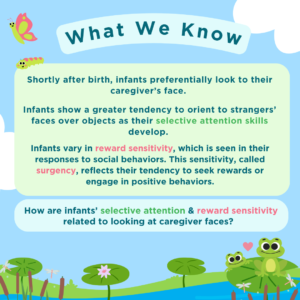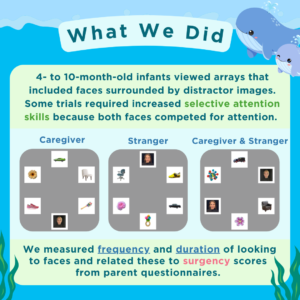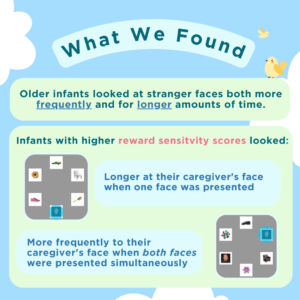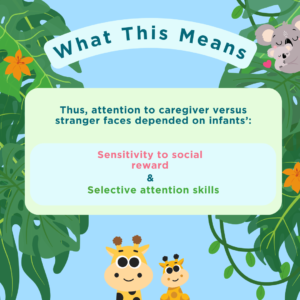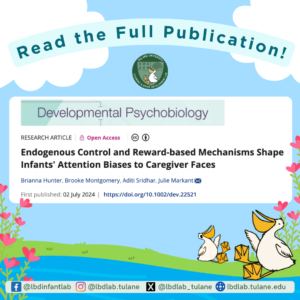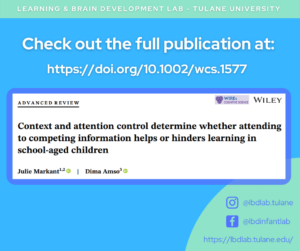Publications
Our research explores learning and attention development through infancy, childhood, and adulthood. Learn more about our previous studies and recent findings!
Our research explores learning and attention through infancy, childhood, and adulthood. Learn more about our previous studies and recent findings!
Endogenous Control and Reward-based Mechanisms Shape Infants’ Attention Biases to Caregiver Faces
Hunter, B., Montgomery, B., Sridhar, A. and Markant, J. (2024)
Developmental Psychobiology., 66: e22521
Developmental Psychobiology., 66: e22521
Individual differences in selective attention and engagement shape students’ learning from visual cues and instructor presence during online lessons
King, J., Marcus, T. & Markant, J. (2023)
Sci Rep 13, 5075
Sci Rep 13, 5075
Six- to ten-year-old children do not show race-based orienting biases to faces during an online attention capture task
Hunter, B.K., & Markant, J. (2023)
Journal of Experimental Child Psychology, 230
Journal of Experimental Child Psychology, 230
Caregiver faces capture 6- to 10-year-old children’s attention during an online visual search task.
Hunter, B. K., & Markant, J. (2023)
Developmental psychology, 59(2), 344–352.
Developmental psychology, 59(2), 344–352.
Selective attention to lesson-relevant contextual information promotes 3- to 5- year old children’s learning
King, J., & Markant, J. (2023)
Wiley Interdisciplinary Reviews: Developmental Science, e13237
Wiley Interdisciplinary Reviews: Developmental Science, e13237
Dynamic emotional messages differentially affect 6-month-old infants’ attention to eyes and gaze cues
Noonan, C.F., Hunter, B.K., & Markant, J. (2021)
Infant Behavior and Development, 64
Infant Behavior and Development, 64
Endogenous Control and Reward-based Mechanisms Shape Infants’ Attention Biases to Caregiver Faces
Hunter, B., Montgomery, B., Sridhar, A. and Markant, J. (2024)
Developmental Psychobiology., 66: e22521
Developmental Psychobiology., 66: e22521
Caregiver faces capture 6-to 10-year-old children’s attention during an online visual search task
Hunter, B. K., & Markant, J. (2023)
Developmental psychology, 59(2), 344–352.
Developmental psychology, 59(2), 344–352.
Individual differences in selective attention and engagement shape students’ learning from visual cues and instructor presence during online lessons
King, J., Marcus, T. & Markant, J. (2023). Sci Rep 13, 5075.
Six-to ten-year-old children do not show race-based orienting biases to faces during an online attention capture task
Hunter, B.K., & Markant, J. (2023)
Journal of Experimental Child Psychology, 230.
Journal of Experimental Child Psychology, 230.
Selective attention to lesson-relevant contextual information promotes 3-to 5-year old children’s learning
King, J., & Markant, J. (2023)
Wiley Interdisciplinary Reviews: Developmental Science, e13237
Wiley Interdisciplinary Reviews: Developmental Science, e13237
Dynamic emotional messages differentially affect 6-month-old infants’ attention to eyes and gaze cues
Noonan, C.F., Hunter, B.K., & Markant, J. (2021). Infant Behavior and Development, 64.
Past Publications
Context and attention control determine whether attending to competing information helps or hinders learning in school-aged children
Markant, J., & Amso, D. (2021). Wiley Interdisciplinary Reviews: Cognitive Science, e1577.
Differential sensitivity to species- and race-based information in the development of attention orienting and attention holding face biases in infancy
Hunter, B.K. & Markant, J. (2021). Developmental Psychobiology, 2020.
Individual differences in selective attention and scanning dynamics influence children's learning from relevant non-targets in a visual search task
King, J., & Markant, J. (2020). Journal of Experimental Child Psychology, 193(104797).
Exercise similarly facilitates men and women's selective attention task response times but differentially affects memory task performance
Coleman, M., Offen, K., & Markant, J. (2018). Frontiers in Psychology, 9(1405), 1-19.
Spatial selective attention biases are shaped by long-term musical training and short-term exposure to tones
Cruse, A., Offen, K., & Markant, J. (2018). Brain and Cognition, 125, 106-117.
Attention and perceptual learning interact in the development of the other-race effect
Markant, J. & Scott, L.S. (2018). Current Directions in Psychological Science, 27(3), 163-169.
When increasing distraction helps learning: Distractor number and content interact in their effects on memory
Nussenbaum, K., Amso, D., & Markant, J. (2017). Attention, Perception, and Psychophysics, 79, 2606-2619.
Selective attention as a mechanism of resilience: Attention neutralizes the adverse effects of socioeconomic status on memory in 9-month-old infants
Markant, J., Ackerman, L., Nussenbaum, K., & Amso, D. (2016). Developmental Cognitive Neuroscience. 18, 26-33.
The development of selective attention orienting is an agent of change in learning and memory efficacy
Markant, J. & Amso, D. (2016). Infancy, 21(2), 154-176.
Visual selective attention biases contribute to the other-race effect among 9-month-old infants
Markant, J., Oakes, L.M., & Amso, D. (2016). Developmental Psychobiology, 58(3), 355-365.
Not all attention orienting is created equal: Recognition memory is enhanced when attention orienting involves distractor suppression
Markant, J., Worden, M.S., & Amso, D. (2015). Neurobiology of Learning and Memory. 120, 28 -40.
An eye tracking investigation of developmental change in bottom-up attention orienting to faces in cluttered natural scenes
Amso, D., Haas, S., & Markant, J. (2014). PLoS ONE, 9(1), e85701.
Bottom-up attention orienting in young children with autism
Amso, D., Haas, S. Markant, J., Tenenbaum, E., & Sheinkopf, S. (2014). Journal of Autism and Developmental Disorders, 44(3), 664-673.
Developmental differences in effects of task pacing on implicit sequence learning
Hodel, A.S., Markant, J., Van Den Heuvel, S.E., Cirilli Raether, J.M., & Thomas, K.M. (2014). Frontiers in Psychology, 5, 153.
Leveling the playing field: Attention mitigates the effects of individual variability in intelligence
Markant, J. & Amso, D. (2014). Cognition, 131(2), 195-204.
Contributions of COMT Val158Met to cognitive stability and flexibility in infancy
Markant, J., Cicchetti, D., Hetzel, S. & Thomas, K.M. (2014a). Developmental Science, 17(3), 396-411.
Relating dopaminergic and cholinergic polymorphisms to spatial attention during infancy
Markant, J., Cicchetti, D. Hetzel, S. & Thomas, K.M. (2014b). Developmental Psychology, 50(2), 360-369.
Selective memories: Infants’ encoding is enhanced in selection via suppression
Markant, J. & Amso, D. (2013). Developmental Science, 16(6), 926-940.
Copyright Notice: The documents distributed here have been provided as a means to ensure timely dissemination of scholarly and technical work on a noncommercial basis. Copyright and all rights therein are maintained by the authors or by other copyright holders. notwithstanding that they have offered their works here electronically. It is understood that all persons copying this information will adhere to the terms and constraints invoked by each author’s copyright. These works may not be reposted without the explicit permission of the copyright holder.



